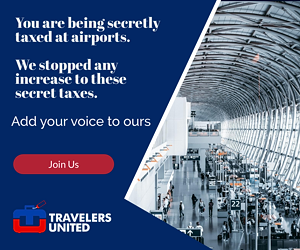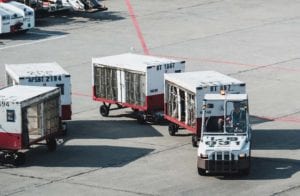The airline gate agent said, “The bag is too big.” They wanted an extra baggage charge.

“The bag was too big,” says Cooley, who runs a nonprofit organization in Mesa, Ariz. “I would have to pay an additional fee of $75 to bring it on board.”
Cooley is not alone. The airline industry collected $29 billion in baggage fees last year, according to a new report by IdeaWorksCompany. Baggage fees now account for 4 percent of airline revenues.
How are airlines getting people to pay?

“I didn’t want to risk abandoning my bag or missing my flight,” she says, “so I paid the fee.”
Don’t let that happen to you. I have a few strategies to avoid paying extra for your airline luggage. They include studying the airline’s luggage rules, adopting unconventional methods of getting your stuff on a plane, taking practical steps to ensure your bags are underweight, and other shortcuts.
But the best way may be to avoid the most avaricious airlines. I’ll tell you how to do that, too.
Make sure you’re following the airline luggage rules — and then some
Look up the size and weight requirements on your airline’s website. “Familiarize yourself with the airline’s policy regarding checked and carry-on luggage before you book your flights,” says Pallavi Sadekar, head of operations at VisitorGuard.com.
And here’s a trick I’ve learned from years spent as a consumer advocate and air traveler: Make sure your luggage is smaller and weighs less.
Why? Because gate agents have a lot of flexibility in how they apply the rules, and they’ve been a little overzealous lately. Of course they have! Airlines incentivize their agents to collect as much money as possible from passengers. If they think you’re an easy mark, they’ll require you to pay a baggage fee.
It’s not worth it. Get a smaller carry-on and make sure it weighs less than the maximum, and they won’t be able to touch you.
Wear your luggage

Suppose you’re serious about wearing your luggage. In that case, you can buy a vest from a company like SCOTTeVEST, which allows you to fit a tablet computer comfortably, a phone, and even a change of clothes into your jacket — and still do it in style. (My spontaneously unpacked winter jacket did not look very stylish.)
Even if you don’t wear your winter coat, you might want to dress strategically for your flight, says Narendra Khatri, principal of Insubuy.
“Consider wearing some of your heavier items on board, such as boots and sweaters, to keep your bag below the limit,” he told me. “Since most flights are fairly cool onboard once they reach cruising altitude, you can afford to overdress a bit to save on bag fees.”
Weigh it yourself — before you leave.
The most common airline charge is for overweight checked bags, says Bob Bacheler, managing director of Flying Angels, a medical transport service.
“Invest in a luggage scale,” he says. “You can purchase one online for under $10. Ensure your luggage is under the weight limit, usually 50 pounds for a domestic flight.”
Bacheler is right. Airlines have gotten super-strict regarding weight, particularly if you’re flying on a domestic flight abroad. If you’re just a fraction of a kilo overweight, they’ll order you to lighten your bag or abandon it. I’m serious.
Membership has its privileges, but …
Stop me if you’ve already heard this, but you’ll get a “free” checked bag if you belong to an airline’s loyalty program.
“Open an airline miles reward credit card,” advises money-saving expert Andrea Woroch. “Not only will an airline miles credit card help you earn miles towards free flights for all the purchases and expenses you pay for using the card, but you will also get other travel perks, including free checked bags with the airline for you and a partner as long as you use the card to book the flight.”
I’ve heard that advice, too. Of course, airlines are trying to get you to join their rewards program, so they’re nudging you into becoming a member by offering you “free” checked bags and “free” miles.
Sigh. If you go down that road, remember there’s no such thing as a free lunch. You will pay for that free bag, and you will pay for the miles somewhere down the line. But Woroch is right. It’s a temporary fix worth considering.
Book an airline that doesn’t have an extra baggage charge
Maybe the easiest way to avoid baggage fees is to avoid an airline with an extra baggage charge. Oh yeah, they still exist.
Southwest Airlines doesn’t charge for most checked bags in the United States.
In the Asia/Pacific region, Air China, Cathay Pacific, Korean Air, and others waive their checked baggage fees. And, of course, the two Gulf carriers, Qatar and Emirates, don’t charge.
In most cases, if you do the math before booking your flight, you’ll find that it’s less expensive — and often more comfortable — to fly on one of these full-service airlines instead of a carrier that nickel-and-dimes you.
Be luggage-smart this summer.
Bottom line: Airlines want more of your money this summer.
They know passengers won’t leave their bags behind, so they charge an extra baggage charge, especially for their carry-on bags. I know because I hear from them constantly at my nonprofit consumer advocacy organization — and I’ve been a target, too.

READ ALSO:
Delayed NPRM will test airline honesty for “avoidable
Why Travelers United supports truth in advertising for travel influencers

Christopher Elliott is an author, consumer advocate, and journalist. He founded Elliott Advocacy, a nonprofit organization that helps solve consumer problems. He publishes Elliott Confidential, a travel newsletter, and the Elliott Report, a news site about customer service. If you need help with a consumer problem, you can reach him here or email him at [email protected].



